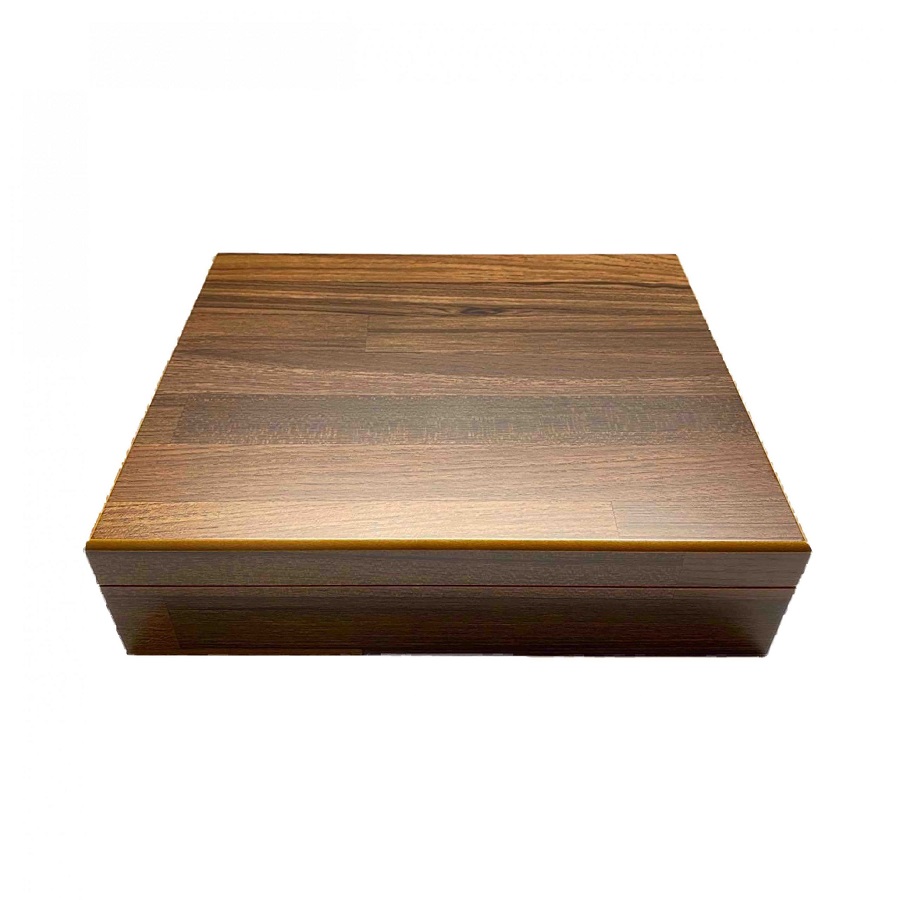Introduction
Cigars have long been synonymous with luxury, relaxation, and celebration. A fine cigar can elevate a moment, whether it’s a special occasion, a quiet evening, or a celebratory toast. However, to truly savor these intricate hand-rolled masterpieces, it is essential to preserve their quality and flavor. This is where a humidor comes into play—an elegant solution to maintain the optimal environment for your cigars.
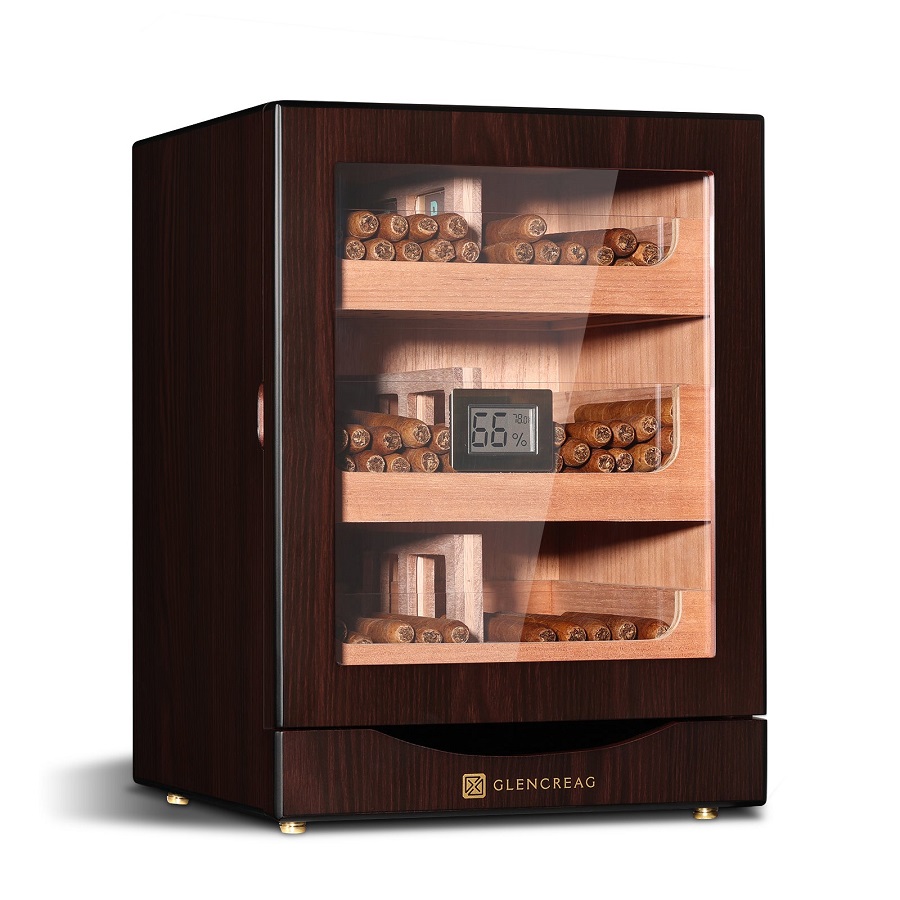
What Is a Humidor?
A humidor is a storage container designed to maintain a specific level of humidity and temperature. By doing so, it protects cigars from becoming too dry or too moist, both of which can compromise their flavor, aroma, and overall smoking experience. A well-maintained humidor ensures that your cigars age gracefully, allowing the complex flavors and aromas developed during the fermentation process to mature fully.
The Importance of Humidity
Cigars are made primarily from tobacco leaves, which are hygroscopic in nature. This means they can absorb moisture from the environment and retain it, affecting their overall quality. The ideal relative humidity for storing cigars ranges from 65% to 72%. A humidity level below 65% can cause the leaves to dry out, leading to a harsh smoking experience. Conversely, humidity levels above 72% can cause mold growth and an overly damp cigar, making it difficult to light and enjoy.
Types of Humidors
Humidors come in various shapes and sizes, each catering to different preferences and needs:
- Tabletop Humidors: Usually made from wood and lacquered for a polished finish, these are the most common type of humidors. They often come with a hygrometer for measuring humidity and a humidification device.
- Travel Humidors: Ideal for those on the go, travel humidors are compact, portable, and designed to protect your cigars while maintaining their humidity.
- Walk-in Humidors: A luxurious option for serious collectors, these large rooms or cabinets are equipped with advanced climate control systems to maintain optimal conditions.
- Cigar Boxes: Some cigar brands offer boxes that function as humidors, often using specialized materials to help maintain humidity.
- Digital Humidors: Equipped with electronic monitoring systems, these humidors provide precise control over humidity levels, ensuring a consistent environment for your cigars.
Choosing the Right Humidor
When selecting a humidor, consider the following factors:
- Capacity: Reflect on how many cigars you plan to store. A smaller humidor may suffice for casual smokers, while aficionados might seek larger options.
- Material: The wood used in the construction of your humidor significantly affects its performance. Spanish cedar is popular due to its ability to retain moisture and impart a mild flavor that complements the cigars.
- Sealing: The humidor should have a tight seal to prevent moisture loss. Test the seal by closing the lid and observing if it holds water; if it does, you can be confident in its ability to retain humidity.
- Humidification System: Different types of humidification systems are available (such as sponge, gel, or electronic). Choose one that suits your preferences for maintenance and reliability.
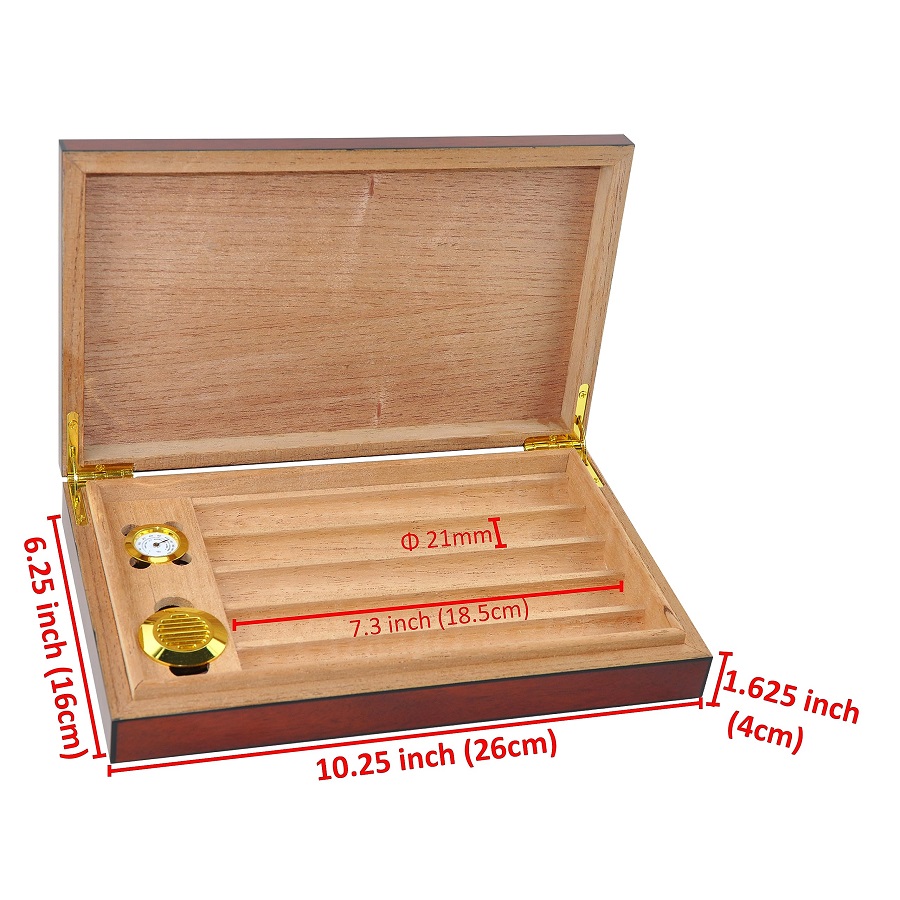
Setting Up Your Humidor
Once you have your humidor, it’s time to prepare it for use:
- Seasoning: Before placing your cigars in the humidor, you need to season it. This involves wiping the interior with a damp cloth and placing a small bowl of distilled water inside for several days until the humidity levels stabilize. This step is crucial for wooden humidors to prevent the wood from absorbing moisture from your cigars.
- Humidity Control: After seasoning, you can add your humidification device and monitor humidity levels using a hygrometer. Adjust the humidification system as necessary to achieve the desired environment.
- Placement: Position your humidor in a stable and consistent environment, away from direct sunlight, heaters, or air conditioning units, which can disrupt humidity levels.
Maintenance Tips
To ensure the longevity of your humidor and the quality of your cigars, regular maintenance is vital:
- Check Humidity Levels: Regularly monitor humidity with a hygrometer. Ideally, check weekly or biweekly.
- Replenish Humidification: Add distilled water or propylene glycol solution to your humidification device as needed to keep humidity levels steady.
- Clean Periodically: Every few months, wipe down the interior with a soft, dry cloth to avoid mold and the buildup of odors.
The Aesthetics of Humidors
Beyond functionality, humidors can be exquisite pieces of art. Many are crafted with intricate designs, high-quality finishes, and elegant hardware. Some are even customizable, allowing you to engrave your name or a special message. The aesthetics of your humidor can reflect your personal style and create an inviting atmosphere for enjoying cigars.
Understanding the Importance of Humidity
Cigars are made from tobacco leaves, which are naturally hygroscopic, meaning they absorb moisture from the environment. A well-maintained humidor provides a controlled environment that prevents cigars from drying out or becoming overly moist, both of which can ruin your smoking experience.
Ideal Humidity Levels
The ideal relative humidity (RH) for storing cigars generally ranges from 65% to 75%, with many experts recommending a target of 70%. This level helps to preserve the essential oils and flavors of the tobacco while preventing mold growth and other pests.
Exceeding 75% RH can lead to mold problems, while lower levels can cause cigars to dry out, resulting in a harsh and flavorless smoke.
Selecting the Right Humidor
Types of Humidors
- Wooden Humidors: Often crafted from Spanish cedar, these are the most popular choice. Cedar not only helps maintain humidity but also imparts a subtle flavor to the cigars.
- Glass Top Humidors: These allow you to display your collection while maintaining humidity. However, they may require additional monitoring for humidity.
- Travel Humidors: Designed for mobility, they are smaller and offer temporary storage, suitable for short trips.
- Electronic Humidors: These provide precise control over humidity and temperature, often featuring digital displays and automatic monitoring systems, making them ideal for serious collectors.
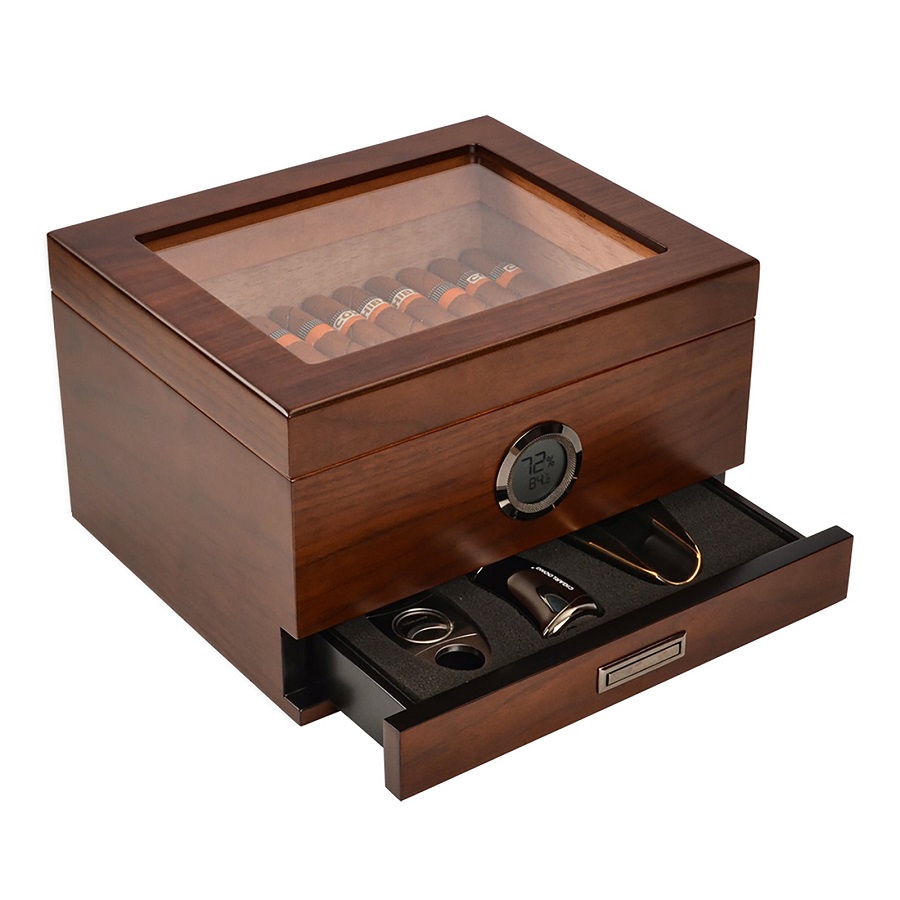 Humidor Size
Humidor Size
When selecting a humidor, consider your collection size. While bigger is generally better for long-term storage, a smaller humidor may require more frequent maintenance to maintain stable humidity.
Humidor Setup: Initial Steps
Seasoning Your Humidor
Before placing your cigars in your new humidor, it is imperative to season it properly:
- Cleaning: Wipe the interior lightly with distilled water to remove dust and particles.
- Humidity Source: Use humidification materials—these can be sponges, beads, or gel packs—to slowly raise the humidity.
- Monitor Levels: Use a hygrometer to track humidity changes. The goal is to reach 70% RH within a few days without any sudden spikes.
- Duration: Allow your humidor to season for about 48 hours for wood humidors, while others may require more time.
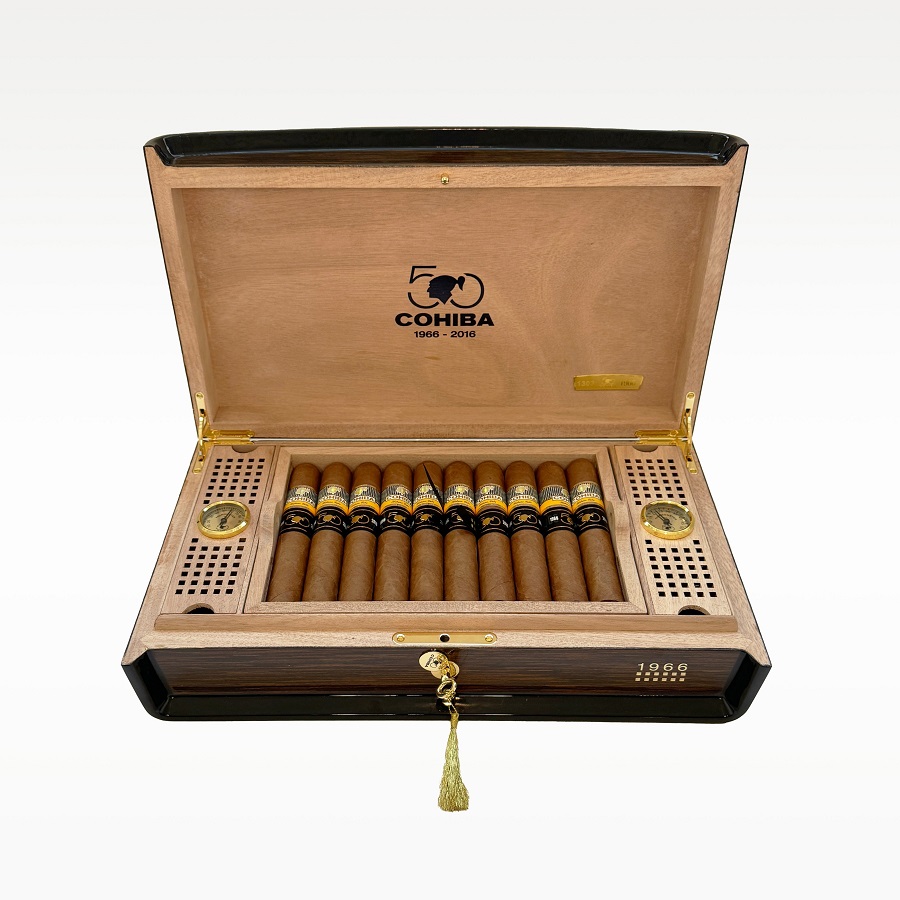 Maintaining Humidity Levels
Maintaining Humidity Levels
Regular Monitoring
Invest in a reliable hygrometer to keep track of humidity levels. There are two types:
- Analog Hygrometers: These are less expensive but may require calibration.
- Digital Hygrometers: These are generally more accurate and often come with temperature displays as well.
Using Distilled Water
It’s crucial to use distilled water or specially formulated humidification solutions to refill humidifiers. Tap water can introduce impurities and minerals that may negatively affect the tobacco.
Humidification Devices
Choose the right humidification device for your humidor. Options include:
- Sponges: Simple and cost-effective but require regular monitoring and changes when they dry out.
- Beads: Can hold and dispense moisture more efficiently, requiring less frequent replenishing.
- Gel Beads: Similar to traditional beads but often come pre-mixed with propylene glycol for added humidity control.
Environmental Factors
Place your humidor in a cool, dark place, away from direct sunlight or heat sources (like radiators). Ideally, your humidor should be kept at a consistent temperature of 65°F to 70°F.
Essential Maintenance Tips
- Check Regularly: Monitor the humidity levels at least once a week. This helps to identify any potential issues before they become serious.
- Replenish Humidification: Top off your humidification device as needed. In drier climates, you may need to refill more frequently.
- Keep It Closed: Avoid frequently opening the humidor. Each time it’s opened, humidity levels drop, requiring time to stabilize.
- Clean Periodically: Every few months, clean the humidor’s interior using distilled water and a soft cloth. Be sure to allow it to dry completely afterward.
- Avoid Overcrowding: Leave space for air circulation to ensure all cigars receive adequate humidity.
- Rotate Your Cigars: Periodically rotate your cigars to promote an even aging process.
Signs of Improper Humidity
Be aware of certain warning signs that indicate your humidor’s humidity levels may be off:
- Dry Cigars: If your cigars feel dry and brittle, the humidity is too low.
- Mold: White spots on cigars point to excess humidity, likely above 75% RH.
- Swollen Caps: If the caps of your cigars appear swollen, it may indicate excessive humidity.
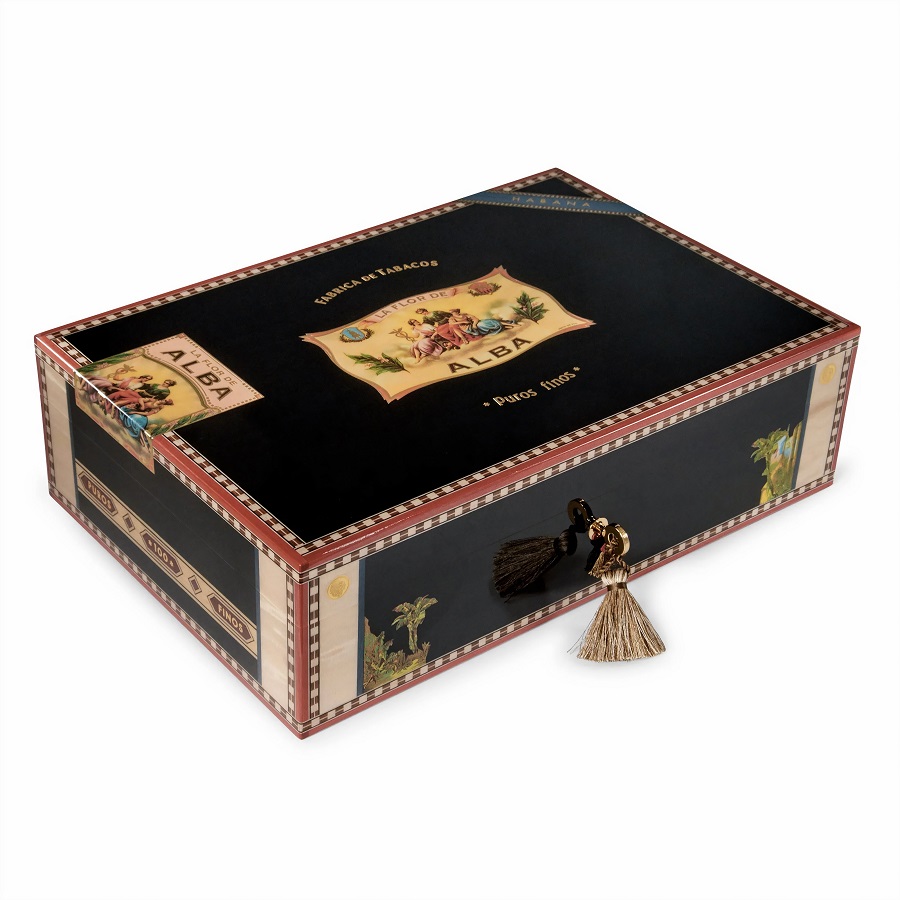
Conclusion
Investing in a humidor is not just about preserving your cigars but also about embracing a lifestyle that celebrates the art of smoking. The ritual of selecting, storing, and ultimately enjoying a well-preserved cigar can be deeply rewarding. When cared for properly, a humidor serves as a guardian of your prized collection, ensuring that every cigar delivers an exceptional smoking experience.
As you embark on your journey into the world of cigars, remember that elegance lies not only in the selection of your cigars but also in how you choose to preserve and appreciate them. A humidor, with its blend of functionality and beauty, serves as a testament to your passion for cigars and the art of enjoyment.
